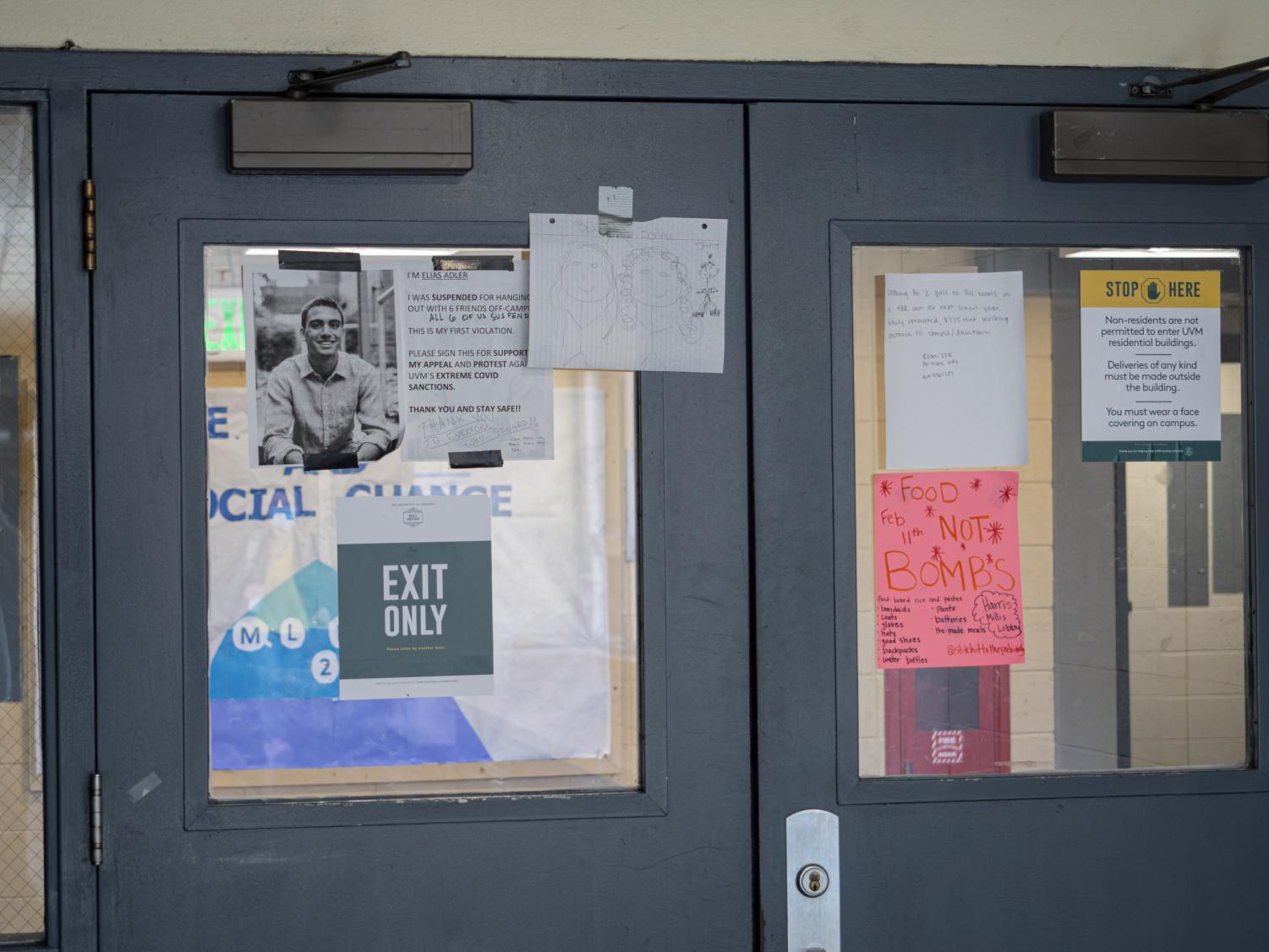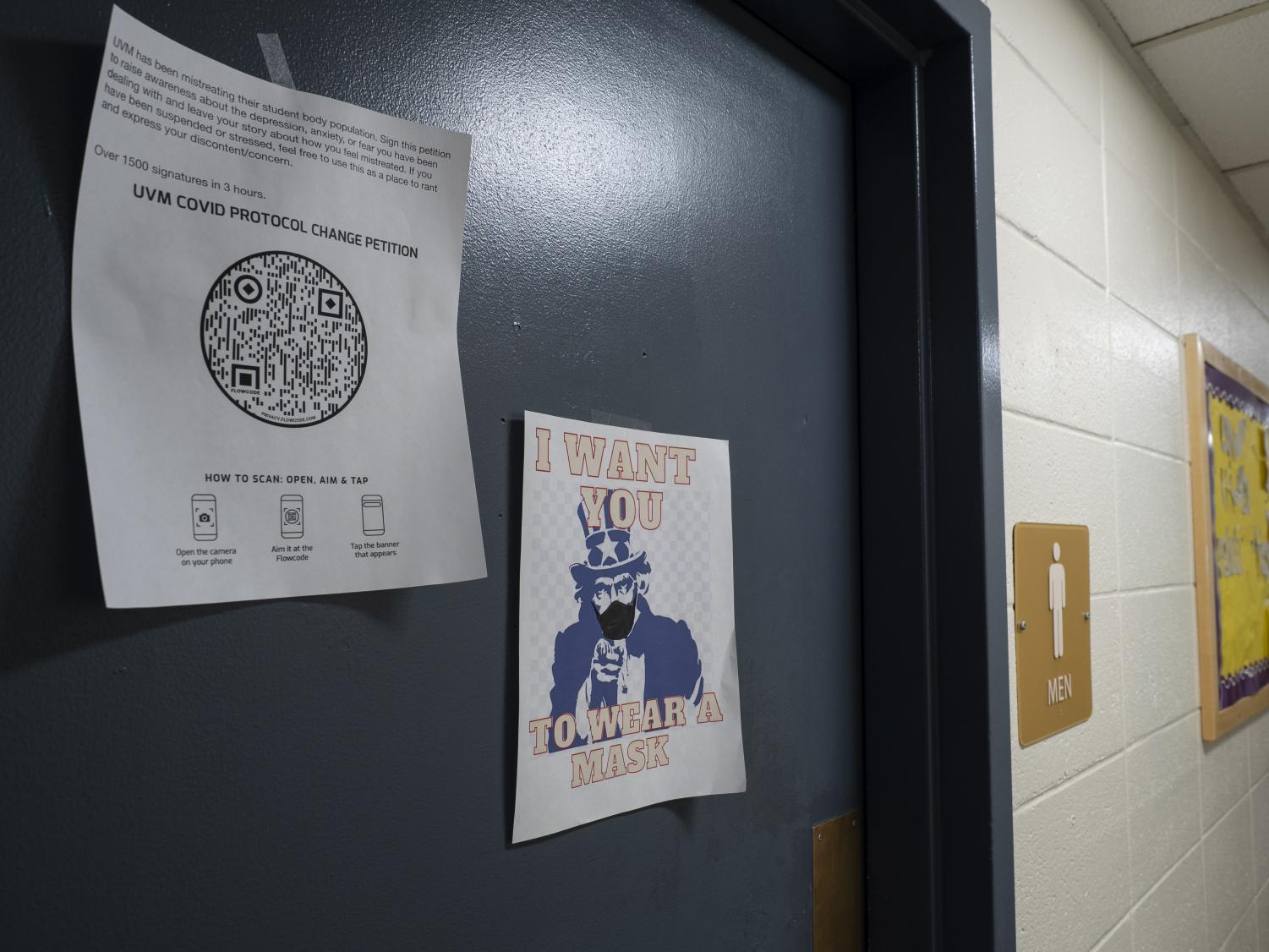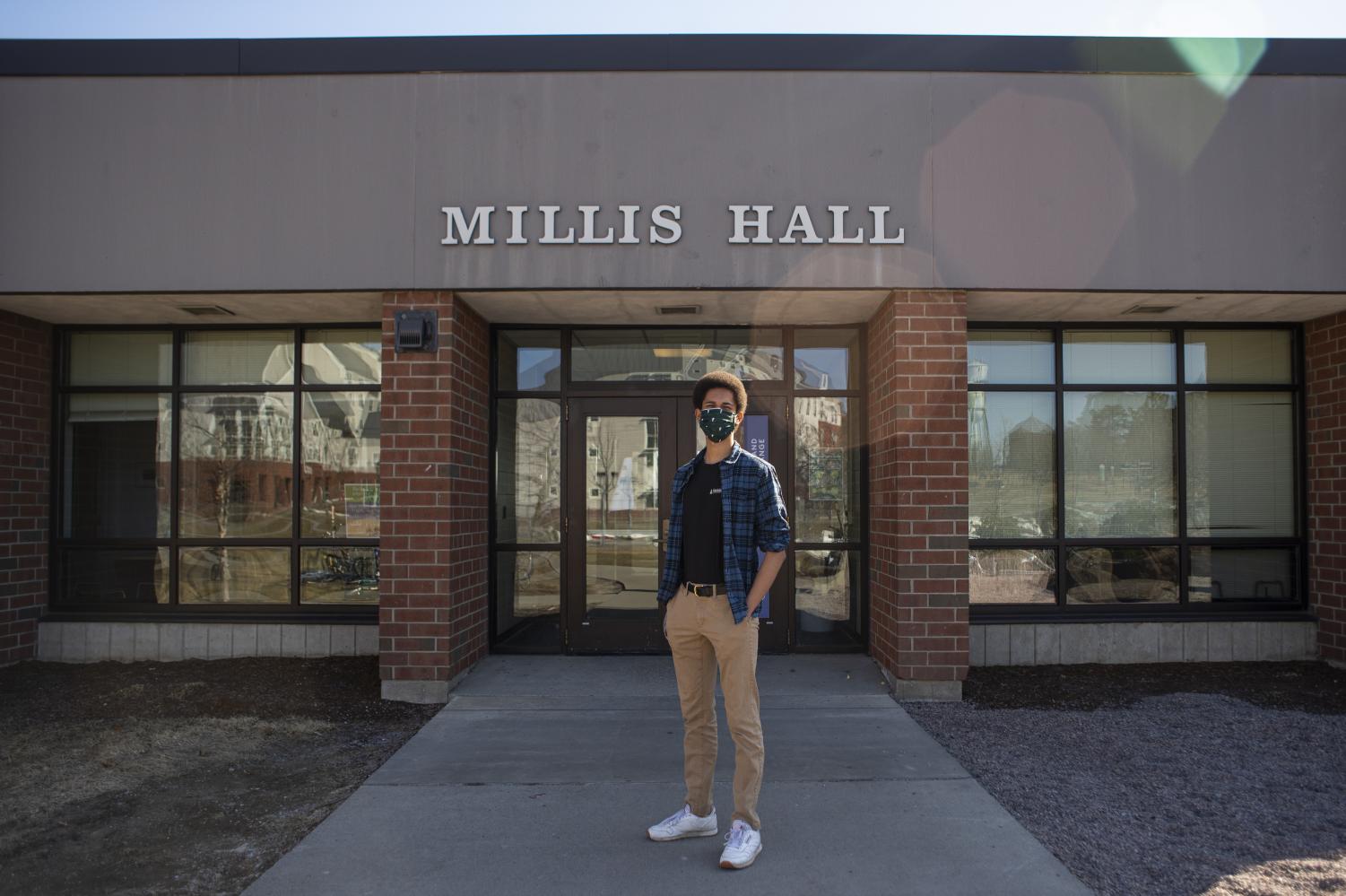Caught between students and admin, RAs voice frustration and guilt about conduct enforcement
April 6, 2021
Editor’s note: Some RAs interviewed for this piece have had their names changed to first name pseudonyms due to fears that UVM would take action against them for speaking out.
Jamie, an RA living on Trinity campus, attended a Microsoft Teams call with fellow RAs and UVM administrators, voicing their concerns about unclear expectations and student mental health.
All the while, their supervisors were sending direct messages to them on Instagram, telling them to “calm down,” Jamie said.
As cases of COVID-19 at UVM continue to rise, RAs have been tasked with writing up on-campus students that violate the Green and Gold Promise, ultimately leading to suspension– a permanent mark on students’ records.
Several RAs have accused administrators of poor communication and unclear expectations, causing extra anxiety, tension and stress for both RAs and students.
RAs were informed of the policy change at the same time students were, said Charlotte, an RA in Coolidge in a March 18 interview. Because of this, RAs weren’t prepared to answer residents’ questions or concerns, they said.
“I’m supposed to be this leader and role model for everyone on the floor, so it’s frustrating to just look everyone in the eyes and say ‘I don’t know,’ when they’re coming to me crying,” they said.
Sophomore Miles McCallum, an RA in Harris-Millis, said in a March 17 interview that the atmosphere on his floor after the policy change was that of confusion and uncertainty.
Students want to stay safe, but they just don’t know what’s okay and what could get them suspended, McCallum said.
“I don’t see residents who are trying to put their community in danger. They’re trying their damn best in the middle of a pandemic, trying to have some semblance of normalcy,” he said. “They want to be within the Green and Gold. They want to keep their community safe.”

Although suspension made sense for some student conduct cases, most other cases were unfair, McCallum said.
“We’ve had a ton of cases that I don’t think have been thought out, fair or necessarily communicated to kids to warrant a suspension,” he said.
Alex, another RA living on Trinity campus said the new policies have made them unapproachable to their residents in a March 17 interview.
“My residents, they’ll see me in the hallway and they don’t even want to say ‘hi,’” they said. “I think they’re nervous because they will hang out in each other’s rooms and think I’m gonna write them up.”
However, Alex said their residents have nothing to worry about since they avoid writing people up due to the extra workload and how the severity of the punishments is unfair a lot of the time.
“It makes the RAs not want to do our jobs because I don’t want to cause someone’s suspension,” they said.
To solve the problem, the administration needs to be more communicative to both students and RAs, McCallum said.
“When kids don’t know what they’re allowed to do… and there are so many unknown variables, that’s when you start running into problems and that’s when people start getting upset,” he said. “And I would argue rightfully so.”
The decision of whether or not to write up a student has become a moral dilemma for RAs, a process that consistently results in feelings of guilt, Jamie said.
“We can hear a party going on, but we know if we don’t bust it we might have to deal with that guilt of having cases, or we have to deal with that guilt of those students being suspended,” they said.
McCallum also said the responsibility of write-ups weighs heavily on RAs.
“Writing residents up for something that at any other time would be a totally normal thing to do, could end up having a huge effect on the kids’ scholarships and their lives,” he said. “That just adds a layer of stress and anxiety to the whole shebang.”
These decisions have only become harder with the added pressure ResLife is placing on RAs, Jamie said.
“I’ve had my supervisors question me if I don’t write a Green and Gold report,” they said. “I haven’t written [a report] in a few weeks and they [asked me] ‘what’s up with that?’”
Along with this, Alex said that even with these extra stressors, there has been no monetary compensation from the University, which makes it harder to continue working.
“I want to keep numbers down as low as possible, but it’s just a lot when the University expects all of this to happen, yet the RAs don’t get any recognition or any extra compensation for having to do these things,” they said.
UVM administration denied RAs’ requests for hazard pay and further protection from COVID-19 early in the school year, according to a Sept. 18, 2020 Cynic article.
The high expectations the University is holding RAs to without recognition is time-consuming and unrealistic, Alex said.
“What frustrates me is that we’re supposed to be upholding these rules but I don’t have all the time in my day to just be monitoring the hallway and I think that’s kind of what our supervisors have asked us to do,” Alex said.
However, according to UVM spokesperson Enrique Corredera, the UVM administration does not agree with the claims RAs have made about the extra pressures and responsibilities being placed on them by supervisors.
“At no time were RAs asked or told to refer more students to the disciplinary process that resides in the Center for Student Conduct, and at no time was additional workload imposed on RAs,” Corredera stated in an April 1 email to the Cynic.
Corredera further challenged RA accusations about taking on a greater workload with an explanation of their responsibilities regarding COVID guidelines.
“RAs have two responsibilities with respect to the COVID protocols,” he stated. “One is to educate their students regarding the COVID rules and what constitutes a violation of them; the other is to report violations when and if they occur.”
However, for Jamie, the extra responsibilities RAs have had to take on during this time have been stressful enough to make them want to quit. The only thing stopping them is the steep price attached to breaking an RA contract.
“I’m very checked out as an RA,” Jamie said. “I tried to quit, but we have to pay $6,000 to quit. That’s upfront in one sum. I can’t do that.”
Corredera did not respond to the Cynic’s question regarding an upfront resignation fee.
Pressure from the students themselves has also added to the mounting stress RAs are dealing with. The extra COVID-19 protocols have led to backlash from students, Jamie said.
“I just feel like [the extra sanctions] mean that when we write students up we’re met with even more anger and frustration from the students, so it’s just an extra stressor,” they said.
First-year Michael Rogan went as far as making a petition calling on the University to rethink the COVID-19 protocols that are in place, but Jamie said this petition unfairly pinned RAs as bad guys.
“I have seen firsthand that many RA’s don’t abide by these COVID guidelines themselves,” Rogan stated in the petition. “If the people UVM hires to keep all students in line cannot even abide by the implemented rules, how can they hold us to a higher standard?”
The petition’s critique on RAs was unfair, Jamie said.
“When that petition came out on the Friday before [Rogan] revised it, it was all just straight shitting on RAs,” Jamie said. “It was just frustrating because I feel like we’re constantly pinned as the bad guys, and people don’t realize that we’re also students.”

Rogan said he was wrong for originally blaming RAs for the issues he saw on campus with COVID-19 sanctions.
“I did see a lot of RAs patrolling and it was kind of just an immediate reaction because they were the people up front doing all the knocking and writing all the people up,” Rogan said.
However, Rogan said he began to realize RAs were not complicit with the new restrictions either.
“The RAs were just kind of being forced to do their job to an extreme and that is not what they signed up for,” he said.
As students already feel the mental burden of the pandemic, it’s hard for RAs to cope with this blame, Jamie said.
“I would personally love for students to stop taking their anger out on me because I’m also a student who is feeling mentally affected by COVID,” Jamie said.
On top of personal mental health, McCallum said he also worries about residents’ mental health, especially due to isolation and the now absent sense of community.
“I became an RA because being a first-year is difficult, and it’s good to have somebody that kind of brings you in and supports you and builds community,” he said. “It’s been really difficult now that a solid half of my interactions with students have been about COVID stress.”
Many RAs have tried to bring up their concerns about student mental health to ResLife and school administrators, Jamie said.
“We’ve been telling ResLife they need to be more transparent and … provide better mental health resources and actively look into better ways to handle COVID in the dorms,” they said.
Corredera confirmed that RAs have raised these concerns to administrators.
“As [admin] told the RAs when we met with them, we were thankful for their openness and for the important role they play,” he stated.
In a March 1 meeting with UVM administrators Gary Derr and Erica Caloiero and RAs, multiple RAs shared their frustration at UVM’s handling of mental health and COVID-19 protocols.
“That first meeting, I think [Derr and Caloiero] were shocked at how angry we all were because the students overtook the meeting and were just bashing them,” Charlotte said.
The RAs’ anger was not malicious, but meant to open the administrator’s eyes to the reality of a situation they created, Charlotte said.
“Our intention was [to tell them to] wake up and see … what we have to deal with on a daily basis because these people who write the rules are not the ones who have to write people up and deal with all of these emotions,” they said.
According to Corredera, administrators were happy to listen to the input RAs had for them.
“As we told the RAs when [admin] met with them, we were thankful for their openness and for the important role they play,” Corredera stated.
However, Alex said many RAs were disappointed in the administration’s response to their concerns.
“People were sharing their frustrations and I almost feel like in those meetings, [the response] is just, ‘we hear you and we appreciate you, but we’re not going to do anything in order to fix this,’” they said.
In fact, some RAs were so upset after the March 1 meeting, they talked of pushing back against the administrators, Alex said.
“That meeting didn’t go over too well with RAs, and I think it fired people up more,” they said. “Honestly, I wasn’t included in this, but there was some talk of the RAs forming a union […] and talk of RAs striking.”
Jamie shared in this frustration but it wasn’t until they received an email from Erica Caloiero, interim vice provost for student affairs, that they really got angry.
“[The meeting] felt productive, but then we were met with this super dismissive email the next day,” Jamie said.
The email from Caloiero, which Jamie perceived as dismissive, was sent to RAs after their March 1 meeting with administrators.
In the email, Caloiero acknowledged RAs concerns around mental health resources and student sanctions and sent along information about CAPS to share with residents.
“I heard—loud and clear—your care and concern for your residents. You shared your worry for their mental health as well as your own stress,” she stated. “I offer no quick or easy fix, this is a challenging time, but I called our medical director today and learned that CAPS has openings every day.”
Caloiero also sent a link with more information on the student conduct process in response to RA concerns about elevated sanctions.
“You have been asked to educate residents about the Green and Gold Promise, and I appreciate you balancing this responsibility with your academic and co-curricular work,” she stated. “but I want to emphasize that many variables factor into a conduct decision.”
For Jamie, this was not the first time they received a dismissive response from administrators, they said.
“Gary Derr, Erica Caloiero, Raf Rodriguez and Amber Buck,” Jamie said. “That’s all upper administration that has dismissed us.”
The administration has been especially bad at responding to RA concerns about mental health, Jamie said.
“When we told them we need better mental health resources on campus, they [responded] ‘well CAPS has five availabilities every day for random drop-ins,’” they said. “We know that five availabilities for everyone aren’t beneficial.”
Alex has had a similar experience with the administration when raising concerns about mental health, citing that their response is always CAPS.
“I think with ResLife and administration they always just say ‘oh refer your residents to CAPS’ and CAPS barely has any appointments,” they said. “Also counseling isn’t for everybody so that can’t be the only thing that UVM [offers].”
However, Corredera emphasized that when administrators responded to RA concerns over mental health with CAPS as the solution, they were genuinely trying to help.
“We were able to share the important information that, contrary to some assumptions out there, counseling appointments through CAPS are readily available to any student who wants one,” Corredera stated.
For many RAs, CAPS is simply not enough given how serious mental health problems on campus are at this time.
Alex underlined the fact that many students and RAs understand the serious nature of the pandemic, but when the school doesn’t address the serious nature of mental health problems, it makes it harder for students to trust the school.
“We understand there is a pandemic, of course, there has to be new rules, but at the same time if you’re not helping address people’s mental health issues they’re not going to want to come to this school,” they said.
If the school doesn’t do more to help its students, they may see a decline in the number of people willing to come back next year, Alex said.
“They need to do more to ensure that students are doing okay, and actually want to stay here because otherwise, you’re going to lose people,” they said.

Susan Shipp • Apr 6, 2021 at 10:14 am
It is evident from Mr. Corredera’s April 1 response to the Cynic in which he challenged RA accusations about taking on a greater workload with an explanation of their responsibilities regarding COVID guidelines that the UVM administration still does not want to address the mental health ramifications of Covid and the Green and Gold Promise on dorm life.
RAs are a critical resource for freshmen and sophomore dorm residents dealing with academic stress, social pressures, adjusting to college life, difficult roommate situations, etc. Add all the challenges of Covid and their informal counseling services are even more critical to the mental wellness of the students living in their halls.
The UVM administration needs to recognize the important role RAs play in helping to provide students with an enriching college experience. RAs need to be trained in peer counseling, encouraged to help residents connect with each other and encouraged by their supervisors to identify dorm issues that need to be addressed. These responsibilities that are just as important as enforcing conduct rules. RAs should be treated as valuable UVM staff and compensated fairly for all their good work.